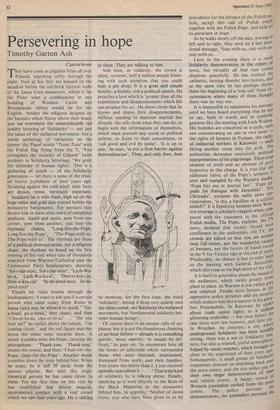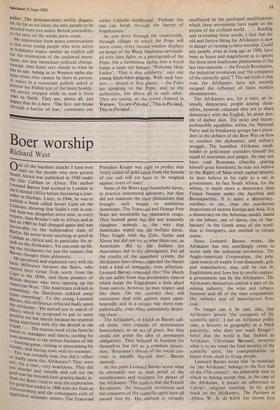Persevering in hope
Timothy Garton Ash
Czestochowa
They have come as pilgrims from all over Poland, marching softly through the night. Now at last they are massed on the meadow before the red-brick fortress walls
of the Jasna Gora monastery, which is for the Poles what a combination in one building of Windsor Castle and Westminster Abbey would be for the English. Amidst the religious insignia on the banners which flutter above their heads
you see everwhere the unmistakeable red jumbly lettering of 'Solidarity' — not just the name of the outlawed movement, but a whole anthology of variations on the theme: the Papal motto 'Totus Taus' with the Polish flag flying from the T, 'You strengthen the students of Gdansk' (with students in Solidarity lettering), 'We greet the defender of human rights'. This is a gathering of youth — of the Solidarity generation — yet there is none of the relax- ed festive joyfulness of four years ago. Straining against the cold wind, their faces are drawn, tense, nervously expectant.
Suddenly he is with them, high up on the huge white and gold dais erected before the monastery battlements. For minutes they drown him in wave after wave of emotional applause. Again and again, now from one corner, now from another, you hear the rhythmic chants, 'Long-live-the-Pope, Long- live-t he-Pope', 'The- Pope-with-us, The-Pope-with-us'. The rhythms are those of a political demonstration, not a religious chant, the rhythms we heard on the first evening of the visit when tens of thousands marched from Warsaw Cathedral past the Communist Party headquarters, shouting `Sol-i-dar-nosc, Sol-i-dar-nosc', 'Lech-Wa- les-a, Lech-Wa-les-a', `Dem-o-kra-cja, Dem-o-kra-cja', In-de-pend-ence, In-de- pend-once'...
Finally his voice booms through the loudspeakers: 'I want to ask you if a certain person who came today from Rome to Jasna Gora may be allowed to speak."Go- a-head, go-a-head,' they chant; and then 'Clos-er-to-us, clos-er-to-us' `Do you hear me?' he replies above the tumult, 'I'm coming closer,' and the red figure marches down the white steps towards them. A monk stumbles after the Pope, carrying the microphone. 'Thank-you, Thank-you,' chants the crowd, and then: 'Chair-for-the- Pope, chair-for-the-Pope'. Another monk stumbles down the steps behind him. When he stops, he is still 50 yards from the nearest pilgrim. But. with this single theatrical gesture he has come closer to them. For the first time on this visit he has established that almost magical, spontaneous contact with a vast crowd which we saw four years ago. He is talking to them. They are talking to him.
And then, as suddenly, the crowd is silent, reverent, half a million people listen- ing with such attention that you could hear a pin drop. It is a great and simple homily: a homily, not a political speech. He preaches a love which is 'greater than all the experiences and disappointments which life can prepare for us'. He shows them that he knows and shares their disappointments, without needing to mention martial law directly. He tells them what they can do: to begin with the reformation of themselves, which must precede any social or political reform, to listen to their consciences, to `call good and evil by name'. 'It is up to you,' he says, `to put a firm barrier against demoralisation'. Then, and only then, does
he mention, for the first time, the word 'solidarity', letting it drop very quietly into the silent crowd, not Solidarity the outlawed movement, but 'fundamental solidarity bet- ween human beings'.
Of course there is an instant rally of ap- plause: but it is not the thunderous chanting of an hour before — already it is something gentler, more mature. 'It would be dif- ficult,' he goes on, 'to enumerate here all the forms of solicitude which surrounded those who were interned, imprisoned, dismissed from work, and their families. You know this better than I. I just received sporadic news about it . . . ' That is the kind of solidarity he is talking about. Finally, speaking as it were directly to the Ikon of the Black Madonna in the monastery behind him, he appeals;. 'Mother of Jasna Gora, you who have been given to us by
providence for the defence of the Polish na- tion, accept this call of Polish youth together with the Polish Pope, and help us to persevere in hope.' As he walks slowly off the dais, waving to left and to right, they send up a last emo- tional message, 'Stay-with-us, stay-with-us, stay-with-us...'
Later in the evening there is a small Solidarity demonstration in the centre of town, but virtually all that vast crowd disperses peacefully. He has worked the catharsis, turning thunder into hymns, and at the same time he has perhaps shown them the beginning of a 'way out' from cir- cumstances where many of them thought there was no way out. It is impossible to summarise his message until we have heard everything that he has to say, both in words and in symbolic gestures like the meeting with Lech Walesa. His homilies are conceived as a cycle, each one concentrating on one or two areas - the rights of farmers in Poznan, the rights of industrial workers in Katowice — each fitting another stone into the arch. The authorities denounce excessively political interpretations of his pilgrimage. There is an element of truth and an element of pure hypocrisy in this charge. It is true that the elaborate fabric of the Pope's sermons is torn and mangled by the Western media.
'Pope hits out at martial law', 'Pope ap- peals for dialogue with Jaruzelski'. 'For
Chrissake', exclaims the radio news cor- respondent, 'is this a hardline or a softline speech?' It is hypocrisy because most West-
ern coverage is scholarly exegesis when corn-
pared with the treatment in the official Polish media. The Pope, explains the TV news, declared that society should have confidence in the authorities. On TV, the crowds are edited so that you see neither their full extent, nor the wonderful variety
of banners, nor the forests of hands raised in the V-for-Victory sign at the end of Mass.
Predictably, no chance is lost to refer back
to the meeting with General Jaruzelski, which they treat as the high point of the visit. It is hard to generalise about the mood of his audiences, which varies greatly front
place to place. In Warsaw it was rather grey and subdued. People were furious at the oppressive police presence and the security
which isolates him like a mascot in his glass- box Popemobile. In Katowice he spoke about trade union rights to a million glistening umbrellas — but even before the rain there were few banners, and little joY. In Wroclaw, by contrast, a city where underground Solidarity has been notablY strong, there was a sea of Solidarity bn ners, but also a relaxed, joyful atmospher, helped by sunny weather, which brought us close to the experience of four years ago- Subsequently, a small group of SolidaritY supporters insisted on marching back Past the press centre, and the riot police put °II their own larger demonstration of marl, and vehicle power. A happy crowd 01 Western journalists rushed from the press centre. The police pursued the demonstrators, the journalists pursued the
police. The demonstrators swiftly dispers- ed. So far as we know the only people to be arrested were two senior British journalists, to the envy of the whole press corps.
MY impression from many conversations is that even young people who were active in Solidarity expect neither an explicit call for the restoration of the outlawed move- ment, nor any immediate political change. Instead, they listen very closely to what he has to say, tuning in to Western radio sta- tions when they cannot be there in person. A waiter in a restaurant politely asked to borrow my Polish text of the latest homily. All service stopped while he read it from start to finish. They are, above all, just happy that he is here. 'The first visit broke through a barrier of fear,' comments one
senior Catholic intellectual. 'Perhaps this one can break through the barrier of hopelessness.'
As you drive through the countryside, through villages to which the Pope will never come, every second window displays an image of the Black Madonna surround- ed with fairy lights or a photograph of the Pope. On a farmhouse facing into a wood hangs a large red banner: 'Welcome Holy Father'. That is also solidarity,' says one young hitch-hiker-pilgrim. With such ban- ners — absurd at first glance — the Poles are speaking to the Pope, and to the authorities, but above all to each other. They are saying, as the crowd chanted in Warsaw, `To-jest-Pol-ska', `This is Po land, This-is-Po-land'.



















































 Previous page
Previous page